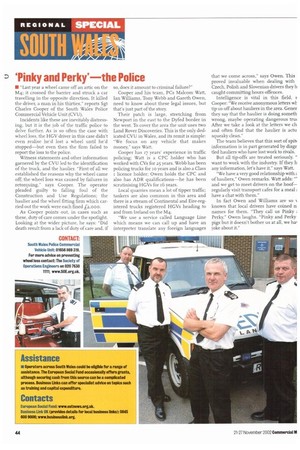'Pinky and Perky'—the Police
Page 44

If you've noticed an error in this article please click here to report it so we can fix it.
• "Last year a wheel came off an attic on the M4; it crossed the barrier and struck a car travelling in the opposite direction. It killed the driver, a man in his thirties," reports Sgt Charles Cooper of the South Wales Police Commercial Vehicle Unit (CV U).
Incidents like these are inevitably distressing, but it is the job of the traffic police to delve further. As is so often the case with wheel loss, the HGV driver in this case didn't even realise he'd lost a wheel until he'd stopped—but even then the firm failed to report the loss to the police.
Witness statements and other information garnered by the CVU led to the identification of the truck, and the haulier. "First of all we established the reasons why the wheel came off; the wheel loss was caused by failures in retorquing," says Cooper. The operator pleaded guilty to falling foul of the Construction and Use Regulations; the haulier and the wheel fitting firm which carried out the work were each fined £2,000.
As Cooper points out, in cases such as these, duty of care comes under the spotlight. Looking at the wider picture, he says: "Did death result from a lack of duty of care and, if
so, does it amount to criminal failure?"
Cooper and his team, PCs Malcom Watt, Ian Williams, Tony Webb and Gareth Owen, need to know about these legal issues, but that's just part of the story.
Their patch is large, stretching from Newport in the east to the Dyfed border in the west. To cover the area the unit uses two Land Rover Discoveries. This is the only dedicated CVU in Wales, and its remit is simple: "We focus on any vehicle that makes money," says Watt.
Cooper has 17 years' experience in traffic policing; Watt is a CPC holder who has worked with CVs for 25 years. Webb has been policing trucks for ro years and is also a Class licence holder; Owen holds the CPC and also has ADR qualifications—he has been scrutinising HGVs for 16 years.
Local quarries mean a lot of tipper traffic; tankers are also common in this area and there is a stream of Continental and Eire-registered trucks registered HGVs heading to and from Ireland on the M4.
"We use a service called Language Line which means we can call up and have an interpreter translate any foreign languages
that we come across," says Owen. This proved invaluable when dealing with Czech, Polish and Slovenian drivers they h caught committing hours offences.
Intelligence is vital in this field, s Cooper: "We receive anonymous letters wE tip us off about hauliers in the area. Gener they say that the haulier is doing someth wrong, maybe operating dangerous tru4 After we take a look at the letters we ch and often find that the haulier is actu squeaky dean."
The team believes that this sort of spit information is in part generated by disgr tied hauliers who have lost work to rivals.
But all tip-offs are treated seriously. " want to work with the industry. If they h any information, let's have it," says Watt.
"We have a very good relationship with of hauliers," Owen remarks. Watt adds:"' and we get to meet drivers on the hoof— regularly visit transport cafes for a meal ; have a chat with them."
In fact Owen and Williams are so known that local drivers have coined n names for them. "They call us Pinky ; Perky," Owen laughs. "Pinky and Perky pigs but it doesn't bother us at all, we ha, joke about it."




























































































































































